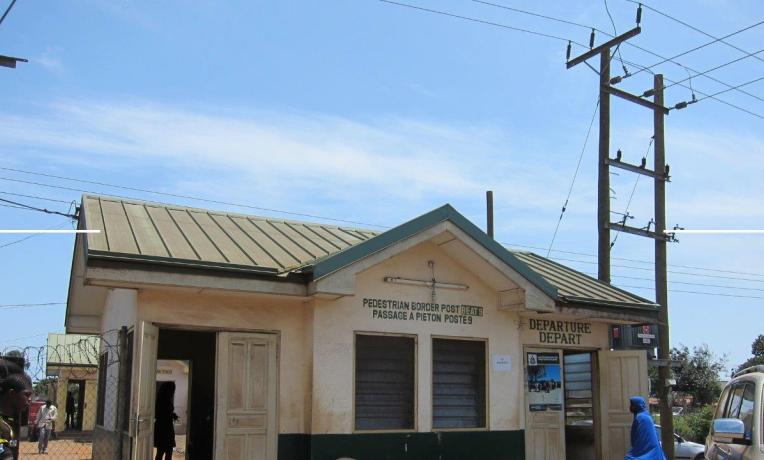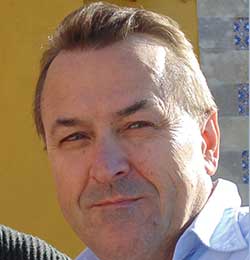Moving around Africa – paths for people and products

African countries, like all others, have been taking measures to restrict the spread of COVID-19. Their success partly depends on how the population and their goods move through the continent. As part of our series on the ERC’s Scientific Officers and their favourite ERC funded research, political scientist Inge Ruigrok reflects on her own work in Africa. In parallel, she takes a timely look at Paul Nugent’s research into transport hubs, corridors and borders in African states.
As the COVID-19 pandemic flared up across Europe, many African countries moved fast to declare a state of emergency. They shut down national borders to limit the spread of the virus, and to block regular migration routes. South Africa, for instance, closed its borders very quickly and erected a 40 km fence along the border with Zimbabwe.
One evening, while all this was happening, I was listening to a webinar by Paul Nugent, Professor of Comparative African History at the University of Edinburgh. He drew from the findings of his ERC-funded project AFRIGOS to reflect upon about how borders enforce the notion of citizens versus aliens, and involve a redefinition of state power.
Investigating the concept of 'respacing' in Africa through a comparative study of port cities and border towns situated along busy transport corridors.
Paul Nugent and his team are developing the concept of 'respacing' in Africa through a comparative study of port cities and border towns situated along busy transport corridors across Africa. These dynamic and cosmopolitan ‘strategic nodes’ connect African urban centres to each other and to the rest of the world. In recent years, the global linkages have intensified because of increased investment, while there also is a strong political drive towards regional integration. AFRIGOS investigates this process, while, at the same time, tracking on the ground how policies intended to facilitate such transformation actually work out.
Social inequalities
The challenge of spatial reorganization and governance is very important and has haunted the African continent since independence was achieved by its numerous countries. The African Union’s policies on regional integration and cooperation, the new comprehensive EU strategy with Africa, China’s investments in Africa’s infrastructure, and the continent’s growing prominence in the world economy have their part to play. An urgent question is whether new policies and practices benefit citizens - whose livelihoods are often rooted in the informal sector - and also diminish social inequities. For this reason, I found AFRIGOS to be a most important project.
The importance of fundamental research into changes taking place on the African continent is undeniable.
Resourcefulness
As ERC Scientific Officers, we monitor a large portfolio of ERC-funded projects from granting stage to their closure after five years. When AFRIGOS’ first scientific report arrived on my desk, memories of my years in Southern Africa came to my mind: the buzzing cities, colours and smells, the resourcefulness and generosity of people, the magnificent landscapes. In the past, I worked as a journalist in Johannesburg for Dutch news media, which gave me the opportunity to travel widely in the region.
When I covered the signing of the peace agreement in Angola in 2002, I became intrigued with the intense political change and renewed hope after three decades of violent conflict. Angola was set to become a regional power because of its oil and diamonds, and yet so little was known about what people had actually lived through and how the promise of peace and democracy would affect their lives. As the fast-pace of journalism did not allow me to spend much time documenting these untold stories of war, I successfully applied for a NWO-WOTRO Science for Global Development PhD Fellowship.
Challenging fieldwork
While the VU University in Amsterdam became my academic home, my research brought me to the interior of Angola, to former rebel-held areas that had been cut off from central state power for over ten years. I spent close to a year there, interviewing people and gathering data, but also training young Angolans in research methods, and organising workshops with civil society and government officials to share my findings on local governance and decentralisation. Conducting fieldwork in such areas is intense and brings all kinds of risks.
Equally, for AFRIGOS, research sites include almost inaccessible locations in various parts of Africa, which has often meant cumbersome processes to secure research permits and sometimes the need to revise research schedules.
Conducting fieldwork in such areas is intense and brings all kinds of risks.
For instance, during the Kenyan elections of 2018, Nugent and his team needed to suspend research for some time for safety reasons, and were only partly able to carry out their fieldwork plans in South Sudan, the Democratic Republic of Congo and Central African Republic.
Mix of methods
An inventive aspect of AFRIGOS is its mix of research methods, and the compelling way in which political science, anthropology and geography are combined. Such an interdisciplinary approach makes it possible to trace tensions between policy plans and inevitably more complex realities on the ground. The importance of frontier research on changes taking place on the African continent is undoubted; I am happy that the ERC does not shy away from funding risky projects.
An inventive aspect of AFRIGOS is its mix of methods, and the compelling way in which political science, anthropology and geography are combined.
A project like AFRIGOS can prove a remarkable thesis about the ‘reconfiguration’ of Africa today, and hopefully counter-balance so-called 'Afropessimist' views. It may also provide highly relevant information for policy and development planning, and contribute to improving people’s well-being and opportunities in life.
 Prof Nugent © Paul Nugent
Prof Nugent © Paul Nugent
Prof Nugent has an outstanding record and published influential articles and books, for instance, his highly regarded Africa since Independence: a Comparative History. He has founded, and chairs, an exciting research network on African borderlands (ABORNE) that has been very productive for African Studies. He is committed to training and advancing early career researchers.

